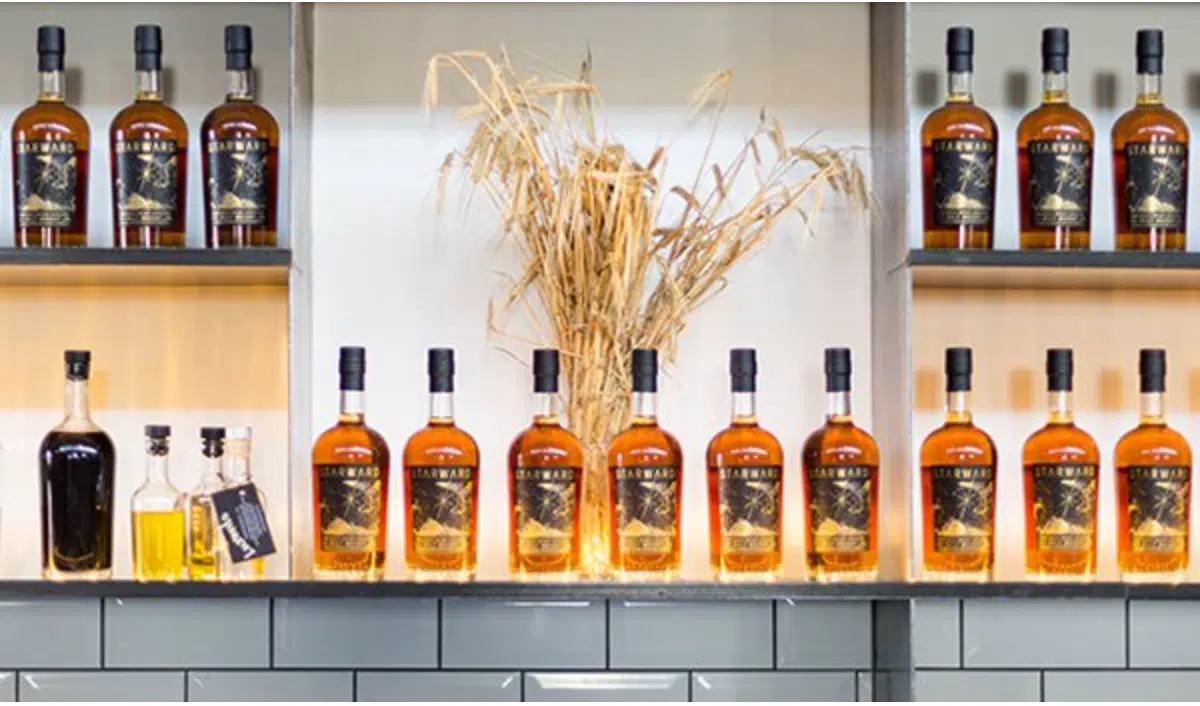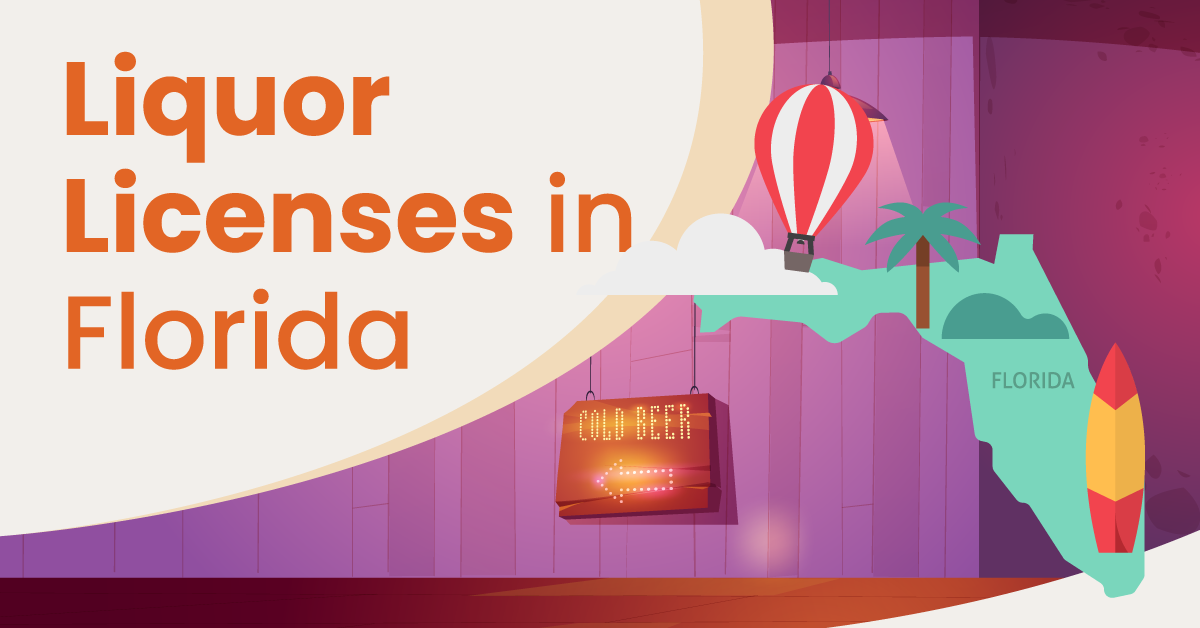
Opening a business selling alcoholic beverages is quite unique in the sense that the owners must first obtain a liquor license. In addition, each state has many policies regulating the sale and distribution of alcohol.
Although Florida is not one of the alcohol control states, obtaining a liquor license is easier said than done in the Sunshine State. And that’s not to mention the cost. So, how much does a liquor license cost in Florida? In this article, we’ll walk you through how much a liquor license can cost in Florida, the most common types of licenses, and the process of obtaining them.
1. How Much Does a Liquor License Cost in Florida?
In Florida, the liquor license cost depends on the type of alcohol you plan to sell or distribute. Additionally, it depends on the number of liquor licenses available and the county where your business is located.
Annual liquor license fees in Florida range from $14 to $1,828. In addition, there are other alcohol-related licenses that your business may be required to obtain that cost between $25 and $4,000. For example, a beer, wine, and liquor distributor is required to pay $4,000 per establishment or branch. The same applies to a distiller of spirituous liquors.
For example, the annual fee for a consumption on-premises license (4COP license) for counties with a population over 100,000 is $1,820. All bars, nightclubs, and restaurants must purchase this license. You may also have to pay other license fees that are not based on county population, depending on the type of license requested. For quota licenses, the application fee is $100 per application. Temporary licenses cost one-quarter of the permanent license fee or $100, whichever is greater.
If you need a quota license, you may need to purchase one from an existing owner on the open market. The cost will vary depending on demand. Once you have purchased a license, the next step is to request a transfer of ownership from the State of Florida.
2. What Are The Main Types of Liquor License In Florida?
Depending on your business, different types of liquor licenses may be required in Florida. In addition, you may need to obtain more than one type of liquor license for the proper operation of your business.
For example, a company may need a license to serve alcoholic beverages and another license to transport alcohol on its premises. Liquor licenses in Florida can be divided into two categories: Alcoholic Beverages Licenses and Quota Alcoholic Beverage Licenses.
Alcoholic Beverages Licenses include the vast majority of licenses in Florida:
- Alcohol brand registrant and brand/label
- Bottle club
- Common carriers (passenger carriers)
- Limited permits
- Manufacturers/distributors
- Miscellaneous permits
- Pool buying
- Retail beverage
- Salesperson of wine & spirits
When it comes to quota alcoholic beverages licenses, these include the Quota Drawing Business Entry and the Quota Drawing Individual Entry.
Overall, alcoholic beverage licenses in Florida fall into five main categories with many subcategories within them:
- Manufacturer/distributor
- Retail
- Wine and spirits vendor
- Miscellaneous
- Quota
Retail Licenses
Within retail, there are 41 types of retail liquor licenses available in Florida. Your qualification for these retail licenses depends on your business and the type of alcohol you plan to serve or sell. Examples include lodges, clubs, performing arts centers, golf clubs, caterers, and race tracks. The cost of these retail licenses ranges from $50 to $2,500.
Quota Drawings
The quota liquor license is slightly different from all other types of licenses. This license allows a business owner to sell beer, wine, and liquor and may or may not be required in addition to the other licenses. What makes them special is the difficulty in obtaining them. As the name suggests, there is a quota for the number of licenses available for sale in Florida, depending on the county you are in.
Counties can only issue one quota license for every 7,500 people in the county. For instance, only two quota licenses may be issued in a county with a population of 21,000. Business owners must enter a “lottery” to earn the right to apply for a quota license.
The winner of the quota lottery wins the right to apply for an available license in that county. If you do not win this lottery, however, an option is available – you can buy a quota license from someone who already has one.
Manufacturer and distributor Licenses
Manufacturers and distributors are required to apply for a license to conduct manufacturing or distribution activities in Florida. Fourteen types of licenses apply to the manufacture and distribution of alcohol in Florida. These licenses range from $100 to $1,000, depending on the type of alcohol you use and your business.
In addition, manufacturers, grinders, and distributors must register each type of bottle label that is moved or sold in Florida. This license is called the Alcohol Brand Registrant and Brand/Label license and costs $0 to $30 per new label submitted.
If you are hosting an event in Florida and are looking for an alcohol license, Florida has five options to choose from. Event liquor licenses include temporary licenses, non-member sales, temporary conventions, special temporary licenses, and temporary/permanent space extensions. These licenses cost between $25 and $100, depending on the type of license you are applying for.
Wine and Spirits Vendor Licenses/ Salesperson
This license is required for individuals employed by a wholesale distributor who needs a license to sell wine or distilled spirits. The fee for this vendor license is $50 per person, and background information must be provided to qualify.
Miscellaneous licenses
There are many miscellaneous liquor licenses in Florida that range from $0 to $100. These licenses include Sacramental Wine Permits (SWP) used in places of worship, State Bonded Warehouse Permits (SBW), and Off-Premises Storage Permits (OPS).
3. How To Register For a Florida Liquor License?
To obtain a license to sell and export alcoholic beverages, you must register with the Florida Division of Alcoholic Beverages and Tobacco, which is part of the Department of Business & Professional Regulation.
You will also need an Employer Identification Number (EIN), meaning your business must be registered with the federal government and the state of Florida before applying for a liquor license.
It is strictly forbidden to begin serving, selling, transporting, or storing alcohol without the necessary permits and licenses. Failure to obtain these can result in hefty fines and immediate closure. You should also be aware that not all counties in Florida allow the sale of alcohol, and you should avoid these areas if you plan to sell alcohol.
Once you register your business, determine what liquor license is needed before operating. You can also consult with alcohol industry professionals or alcohol regulatory authorities for more information.
4. New Florida Liquor License Application Process
Complete Application
First, you need to fill out an application. The application form usually includes the following information:
- Citizenship status
- If a previous liquor license has been revoked within the last 15 years
- Any felony convictions or alcohol-related convictions within the last five years.
- Names and contact information for all owners/parties involved in the business.
- Description of the premises
It should be noted, however, that the liquor license application form covers many more details. Some additional information is required from businesses that sell, serve, store or transport alcohol:
- Fingerprints of all persons involved in the business
- Arrest records (if applicable)
- A sketch of the premises
- Certificate of status from the Florida Secretary of State
- Proof of good character (sometimes required)
District Office Review
Once you have provided the required documents for the first step, you must wait for the district office to review your application.
On-site Inspection
This is the final step before you are licensed to sell or transport alcoholic beverages. The state will conduct a physical inspection of the business location and premises. The inspection will ensure that the establishment complies with state requirements. So make sure your business location complies with Florida rules. Once the location inspection is positive and your application is approved, you will enter into possession of your liquor license.
5. Florida’s Dry Counties
As mentioned above, there are counties where the sale of alcohol is strictly prohibited in restaurants, convenience stores, and liquor stores. There are 3 dry counties in Florida:
- Lafayette
- Liberty
- Washington
This prohibition also applies to all municipalities located in these three counties. Even in counties that allow you to sell beer, wine, or alcohol, the regulations regarding when, where, and how you can sell vary from county to county, and you may need to contact a business attorney to help you sort it all out.
KORONA POS is very user-friendly. You can customize the interface to conform to your business needs. Customer Service is in the United States, always accessible, and always awesome. We love that we can fit it into our scale of business and grow with it.
-Darlene P.
6. The Best POS System for Liquor, Convenience Stores, And Wineries
Once you have obtained the necessary liquor licenses to run your business, you must consider having safe and reliable POS software. And for that, KORONA POS is the right solution. KORONA POS is a POS software tailored explicitly for liquor stores, wine stores, and convenience stores. KORONA POS offers several excellent solutions, including mobile POS options. In addition, you can accept all major credit cards, including Visa, Mastercard, and American Express.
The software also allows you to choose any type of payment processor. Whether you already have the hardware in place and only need a point of sale software or you need a complete system, KORONA POS meets all of your needs and has been rated as the leading point of sale solution for any retail business selling alcoholic beverages.
Ideal POS systems for liquor stores include tools to perform physical inventory, manage customers and employees, provide eCommerce and marketing integrations, and offer multiple payment processing options.
With KORONA POS, all liquor store POS software updates are automatically installed in each of your POS terminals. This will continue, at no cost, for the duration of your subscription. Below are some of the most important features that KORONA POS has to offer liquor shops:
- Automatic inventory ordering
- Coupons, bundles, and promotions
- Time tracking and payroll features
- Expandability to multiple locations and franchises
- Integration of liquor store customer loyalty
- Age verification reminders
- Cloud-based liquor POS system














